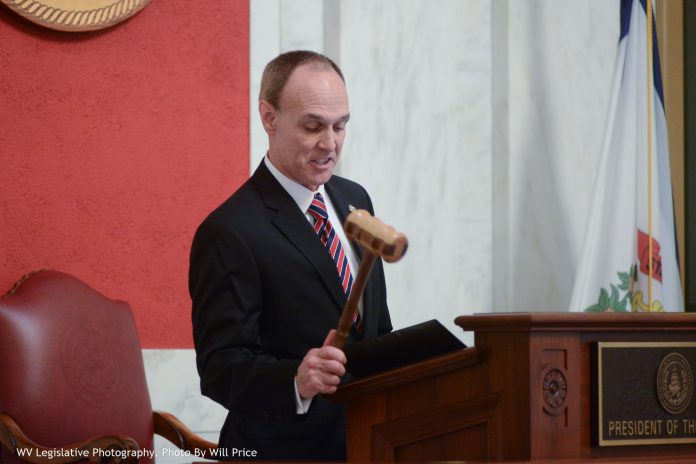As of 4 p.m., Friday, February 17, 2017, the 10th day of the regular session of the 83rd Legislature, 349 bills have been introduced in the West Virginia Senate. Of those bills, ten have passed and have been sent to the House for further consideration. Among those:
Senate Bill 127 would authorize the Insurance Commissioner to promulgate a legislative rule relating to Adoption of a Valuation Manual.
Senate Bill 151 would authorize the Board of Risk and Insurance Management to promulgate a legislative rule relating to the Patient Injury Compensation Fund.
Senate Bill 169 would repeal the article on providing assistance to Korean and Vietnam veterans exposed to certain chemical defoliants or herbicides or other causative agents, including Agent Orange.
Senate Bill 170 would repeal the state hemophilia program.
Senate Bill 171 would repeal Programs of All-Inclusive Care for the Elderly.
Senate Bill 174 would eliminate the jurisdiction of the Public Service Commission over the transportation of household goods.
Senate Bill 176 would repeal the article concerning the detection of tuberculosis, high blood pressure and diabetes.
Senate Bill 230 would require all law-enforcement agencies in this state to certify qualified law-enforcement officers to carry concealed firearms nationwide as provided by the federal Law-Enforcement Officers Safety Act, which would provide statutory authority necessary to give prosecuting attorneys and assistant prosecuting attorneys the option to carry firearms for self-defense pursuant to that federal act upon completion of required training and annual background check and to require law-enforcement agencies to provide qualified retired law-enforcement officers the opportunity to be certified to carry concealed firearms nationwide, under that act.
Senate Bill 233 would exclude oral communications uttered in a child care center from protection under the Wiretapping and Electronic Surveillance Act, as long as there are notices posted informing persons that their oral communications are being intercepted.
Senate Bill 237 would repeal obsolete rules relating to the Department of Revenue and the banking and insurance commissioners.
Additional Senate Bills
Senate Bill 20 would limit health insurance coverage for elective abortions to coverage provided through supplemental policies. Elective abortion exceptions are provided for certain pregnancies that threaten the life of the mother or result from rape or incest.
Senate Bill 37 would raise the legal age for purchasing tobacco, alternative nicotine and vapor products to 21.
Senate Bill 64 would require the disclosure of dark money political expenditures to allow the public to know who is paying for political advertisements.
Senate Bill 66 would modify the definition of a “terrorist act” to include the intimidation directed to either an official or employee of any branch or level of government or to members of his or her family. The bill would also apply existing criminal penalties.
Senate Bill 69 would create a bill of rights for survivors of sexual assault.
Senate Bill 76 would create the West Virginia Second Chance for Employment Act, which would expand eligibility for criminal expungement to persons convicted of certain nonviolent felonies.
Senate Bill 178 would require license plates to be placed on the front and back of all vehicles to improve public safety.
Senate Bill 193 would prohibit the use of tobacco products in a motor vehicle while individuals sixteen years of age or under are present. The bill also provides that the misdemeanor offense created by this section is a secondary offense that may only be charged if a driver has been detained for violation of another vehicle law.
Senate Bill 206 would expand the definition of kidnapping to including taking or gaining custody of, confining or concealing another person by force or threat of force; or by duress, fraud, deceit, misrepresentation or enticement.
Senate Bill 238 would increase the tax credits allowed for the rehabilitation of historic structures from 10 percent to 25 percent.
Senate Bill 260 would require the tax on fuel to be increased by an additional five cents whenever the average wholesale price of motor fuel is less than $2 per gallon.
Senate Bill 271 would prevent the State Board of Education from implementing common core academic standards and assessments, as well as establish a process and criteria for the state to develop alternate academic standards and assessments, prohibit the state board from entering into any agreement which requires implementation of common core standards, and require the state board to report to the Legislative Oversight Commission on Education and Accountability.
Senate Bill 272 would permit employers to test both prospective and current employees for drugs and alcohol.
Senate Bill 278 would permit hunting on Sundays on private land with the consent of the landowner. The bill also eliminates ballot measures pertaining to Sunday hunting and voids the results or any ballot measure prohibiting Sunday hunting.
Senate Bill 295 would provide a tax credit for modifications to homes made more accessible for an elderly person or a person with a disability.
Senate Bill 297 would increase the minimum criminal penalty for transportation of a Schedule I or II narcotic drug into the state from one to three years. These drugs include methadone, oxycodone, opium and morphine, among others.
Senate Bill 316 would require individuals receiving unemployment compensation to seek out seasonal employment.
Senate Bill 317 would authorize a family court judge to order substance abuse counseling of a child in emergency situations.
Senate Bill 324 would prohibit the Governor and the Legislature from administering equal across-the-board budget cuts to all higher education, which would protect community colleges from disproportionate budget cuts.
Senate Bill 334 would provide create the felony offense of aggravated cruelty to animals.

